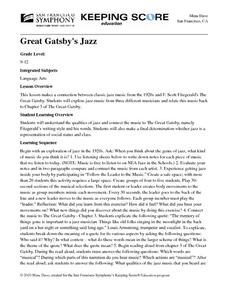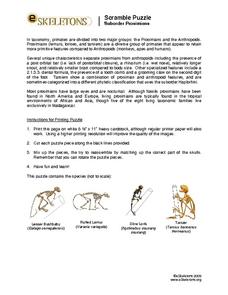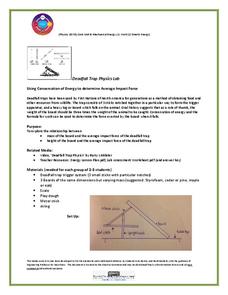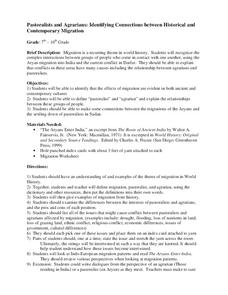Curated OER
The Bill of Rights and You
The right to life, liberty, and the pursuit of happiness. The lesson explains what the Bill of Rights is and how it applies to everyday life, like freedom of speech or the right to a jury trial. Young historians complete hands-on...
EngageNY
End of Unit 2 Assessment: A Hosted Gallery Walk
Speak your mind. Scholars present their claims in groups of three. They use a presentation checklist as each member takes a turn. At the end of the lesson plan, pupils complete an End of Unit 2 Assessment: Presenting a Claim and Findings...
EngageNY
Conducting Research: Analyzing a Variety of Sources to Capture Information about My Insect
From picture to words. Scholars analyze a picture of an ant and then list two facts they observed and any questions that may arise. Expert groups from the previous instructional activity then look at a diagram about either an ant or...
Curated OER
Great Gatsby's Jazz
As Nick wanders the grounds of Gatsby's mansion, he observes the behaviors of the rowdy guests and listens to the music pouring over the lawn. Bring the music of the jazz age into the classroom with Louis Armstrong's "West End Blues,"...
eSkeletons
Skeleton Scramble Puzzle: Suborder Prosimians
Explore the finer details of primate skulls with these puzzles, incorporating advanced scientific analysis of two suborders- Prosimians and Anthropoidea- and one superfamily- Hominoidea. Learners read about the unique characteristics of...
Fun Music Company
Compound Time
To demonstrate their understanding of simple and compound time signatures, young musicians complete a chart by drawing quarter or dotted quarter notes equal in value to the note groups shown.
University of Saskatchewan
Using Conservation of Energy to Determine Average Impact Force
Explore the center of gravity with your science class as they create a deadfall trap with common materials. They research the concepts of energy conservation and gravitational force before dividing into small groups to create a model of...
National Nanotechnology Infrastructure Network
Introduction to Nanotechnology Using the Creative Problem-Solving Model
Should we continue to spend money on nanotechnology? Groups engage in a problem-solving unique process around the newly emerging research field of nanotechnology. In order to propose a solution, the groups must research nanotechnology...
West Contra Costa Unified School District
Key Features of Graphs
The key is ... After a day of instruction on key features of graphs, groups create a poster and presentation on the key features of their given function graph. The resource provides an extension activity of "telephone" using...
National Institute of Open Schooling
p-Block Elements and Their Compounds – II
Ozone, made of three bonded oxygen atoms, is found 15-30 km above Earth, has a strong smell, is blue, and blocks sunlight from hitting the surface of Earth. The 22nd lesson in a series of 36 specifically focuses on the important elements...
National Institute of Open Schooling
p-Block Elements and Their Compounds – I
Lesson 21 in a series of 36 specifically focuses on elements and their compounds from groups 13, 14, and 15 on the periodic table — including boron, carbon, aluminum, silicon, nitrogen, and phosphorus. Classes learn how some of these...
NOAA
Oceans of Energy
Are the earth's oceans really just giant batteries, waiting for their energy to be harnessed? Middle school mechanical engineers will be shocked by the amazing amount of energy that forms around them after diving into part four of a...
Channel Islands Film
Human Impact on the Food Web of Santa Cruz Island
What happens when a non-native species is introduced onto an island? Santa Cruz Island, part of the Channel Island chain located off the coast of southern California, provides the perfect laboratory for young environmental scientists to...
Social Media Toolbox
Verification
When you're putting together a great story, you've got to consider the source! Scholars discover the dangers of errors in reporting during the 14th activity in a 16-part Social Media Toolbox series. Groups collaborate to create a source...
Anti-Defamation League
Who is Malala Yousafzai?
Malala Yousafzai may be young, but she's mighty! Young scholars listen to a short lecture about Malala's background, read an article about her winning the Novel Peace Prize, and meet in groups to discuss statements she has made. Class...
Institute of Electrical and Electronics Engineers
Cast Your Vote
In a simple but unique lesson plan, youngsters learn about the history of voting systems. They then collaborate in groups to develop a new honest and consistent voting method. A class-wide poll is taken, evaluating the designs of other...
Shell Education
Leaders from the 1790s
The Founding Fathers contributed to the United States in many ways. Class members explore various Founding Fathers through research, group work, and realia. The final product of group work are posters and artistic representations of...
Curated OER
The Chemical Building Blocks of Life
Amateur biologists examine the macromolecules that are foundational to life: proteins, lipids, and carbohydrates. This worksheet is composed of five pages of questions and plenty of space to write answers. Learners will explore...
Curated OER
Pastoralists and Agrarians: Identifying Connections between Historical and Contemporary Migration
Pastoralists and agrarians, livestock raisers and farmers. Using the conflict in Darfur as a lens, class members investigate the conflicts that arise when these groups are forced to migrate from one area to another.
Middle Tennessee State University
Preparing for Revolution
Class members create a timeline of actions by both the British parliament and the colonists that led to the outbreak of the American Revolution. Groups use the provided Primary Source Analysis Tool to examine and...
Curated OER
The Pigman: Problematic Situation
What would you do? To prepare readers for the death of Mr. Pignati, one of the characters in Paul Zindel's The Pigman, individuals complete a problematic situation worksheet and then compare their responses to others in their group.
Alabama Department of Archives and History
Alabama and the Treaty of Versailles
As part of a study of the treaty that ended World War I and the seeds of resentment it planted, class groups compare President Wilson's Fourteen Points and the articles of the Treaty of Versailles.
Alabama Department of Archives and History
New Deal Programs in Alabama
New Deal programs are the focus of an activity that prompts middle and high schoolers to consider the end of the Great Depression. Groups examine primary source materials to gain an understanding of how these programs were...
Texas State Energy Conservation Office
Investigation: Concept Mapping Fuels
After reading an article, "Fuels for Everything," collaborative groups create a concept map poster of the transportation and non-transportation fuels. This makes a strong introduction to the different types of fuels used for transportion...
Other popular searches
- Food Groups
- Ethnic Groups
- Self Esteem Group Activities
- Mental Health Group Activity
- Group Work
- Cooperative Groups
- Equal Grouping
- Interest Groups
- Ethnic and Minority Groups
- Pe Games Large Groups
- Five Basic Food Groups
- Five Food Groups























